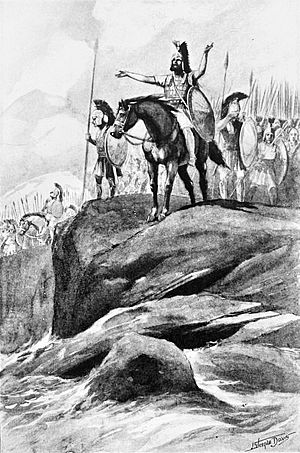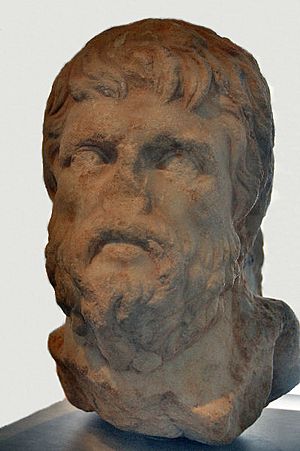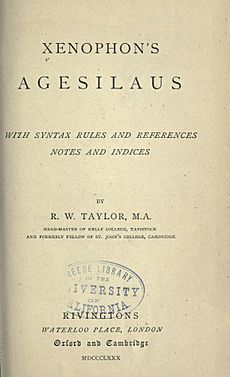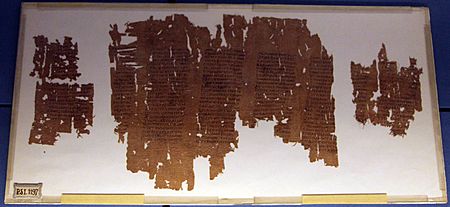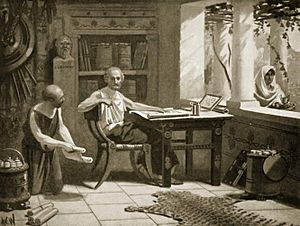Xenophon facts for kids
Quick facts for kids
Xenophon of Athens
|
|
|---|---|
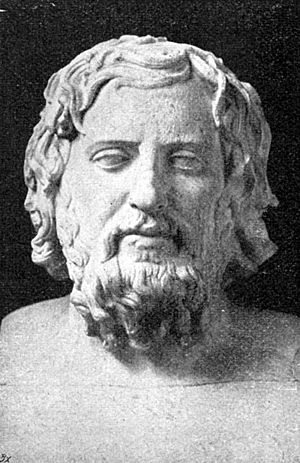
The Greek military leader, philosopher, and historian Xenophon of Athens.
|
|
| Born | c. 430 BC |
| Died | Probably 354 or 355 BC (aged c. 84 or 85) likely Corinth
|
| Nationality | Greek |
| Occupation | Military leader, mercenary, philosopher, historian, writer |
|
Notable work
|
|
| Children | Gryllus and Diodorus |
| Parent(s) | Gryllus |
Xenophon of Athens (born around 430 BC – died probably 355 or 354 BC) was an important Greek military leader, thinker, and historian from Athens. When he was about 30 years old, Xenophon was chosen to lead a large group of Greek soldiers for hire. These soldiers, known as the Ten Thousand, marched deep into the Achaemenid Empire and almost captured Babylon in 401 BC.
Xenophon was a very clever military strategist. He came up with new ways to move armies and was one of the first to write about how to attack an enemy from the side or trick them in battle. His book Anabasis tells the exciting story of his adventures with the Ten Thousand. This book was so inspiring that it even influenced Alexander the Great later on.
Xenophon was also a student and friend of the famous philosopher Socrates. He wrote several books about Socrates' ideas and trial. For a long time, people argued if Xenophon was more of a general, a historian, or a philosopher. Today, he is best known for his historical writings, especially Hellenica, which continues the story of Greece where another famous historian, Thucydides, left off.
Contents
Xenophon's Life Story
His Early Years
Xenophon was born in Athens around 430 BC. His father, Gryllus, came from a rich family that owned horses. Xenophon saw many important events in Athens when he was young. These included the return of a famous general named Alcibiades in 407 BC and the trial of some generals in 406 BC.
His detailed life story really begins in 401 BC. A friend invited Xenophon to join Cyrus the Younger, a Persian prince, on a military trip. Xenophon traveled to Ephesus to meet Cyrus. He wrote all about his experiences during this time in his book Anabasis.
After the Great March
After his amazing journey with the Ten Thousand, Xenophon continued his military career. He joined the Spartan general Thimbron and later Dercylidas in their fights against the Persians in Anatolia. Xenophon often described these events in his Hellenica, showing he was there.
In 396 BC, Xenophon met the Spartan king Agesilaus II and became his friend. He joined Agesilaus's campaigns. Because he fought alongside the Spartans, who were Athens' enemies, Xenophon was banished from Athens.
He likely went with Agesilaus to Sparta in 394 BC. After his military adventures, Xenophon received a large piece of land in Scillus. He lived there for about 23 years. Later, around 371 BC, his land was taken away, and he moved to Corinth. Xenophon probably lived in Corinth until he died around 354 BC, when he was about 84 or 85 years old.
The Great Adventure: Xenophon and the Ten Thousand
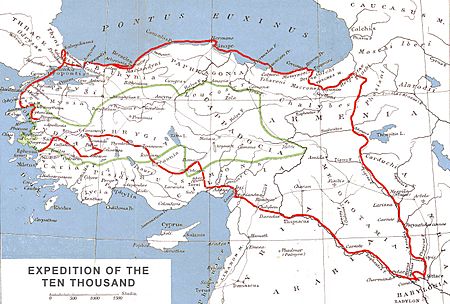
Xenophon's book Anabasis is a famous story about how he helped the Greek soldiers. It tells how he encouraged them when they felt hopeless and led them on a very long march home. People have admired this story for over two thousand years.
Joining Cyrus the Younger
In Anabasis, Xenophon writes that he asked his teacher Socrates for advice about joining Cyrus. Socrates told him to ask the Pythia, a wise priestess. Xenophon asked the oracle which gods he should pray to for a safe journey. When he told Socrates the oracle's advice, Socrates scolded him for not asking if he should go at all!
Cyrus gathered a huge army, including many Greek soldiers, pretending he was going to fight a local Persian governor. The Greeks didn't know that Cyrus actually planned to fight his own brother, Artaxerxes II of Persia, who was the Persian king. When the soldiers found out Cyrus's real plan, they refused to go on. But a Spartan general named Clearchus convinced them to continue.
The Battle and Cyrus's Death
Cyrus's army met King Artaxerxes II's army at the Battle of Cunaxa. The Greeks fought very well, but Cyrus was killed in the battle. After Cyrus died, Clearchus and four other Greek generals were tricked by a Persian governor. They were captured and executed. This left the Ten Thousand Greek soldiers without their leaders.
The Long Journey Home
The Ten Thousand Greek soldiers were now deep inside enemy territory, far from the sea, and without their commanders. They were surrounded by hostile people and armies. So, they chose new leaders, and Xenophon was one of them.
Xenophon became a brilliant general during this retreat. He is known as the "father of the system of retreat" because he figured out how to fight safely while moving backward. He was very creative and always found ways to protect his soldiers.
Clever Military Moves
At first, the Greeks were bothered by Persian horsemen who shot arrows. Xenophon quickly formed a group of archers and light cavalry. The next day, when the Persian horsemen came close, Xenophon suddenly attacked them with his new cavalry. This surprised the Persians, and many were killed or ran away.
Later, a large Persian army chased Xenophon. When the Greeks reached a wide, deep river, it looked like they were trapped. But Xenophon quickly came up with a plan. He ordered all their animals to be killed, stuffed with hay, and laid across the river. They covered the bodies with dirt to make a bridge. Xenophon led his men across before the Persians could reach them.
It was amazing that Xenophon could find food for his army in the middle of a huge enemy empire. He also came up with the idea of destroying villages and crops behind them. This stopped the chasing enemy from finding food and shelter. He also created a "reserve" group of soldiers who could help weak parts of his battle line. These were all new and smart ideas for warfare.
The Ten Thousand then entered the land of the Carduchians, a fierce mountain tribe. The Carduchians attacked them with stones and arrows for days. When they reached a narrow pass, the main Carduchian army was waiting. Xenophon sent 8,000 men to pretend to attack the main force. Meanwhile, he led 2,000 men to a secret pass. They surprised the Carduchians from behind, and the Greeks won the battle.
After more tough mountain fighting, the Greeks reached the Centrites River. A large Persian force blocked their way north. With the Carduchians attacking from behind, Xenophon was in danger again. But his scouts found another river crossing. When the Persians moved to block it, Xenophon sent a small group back to the first crossing. This made the Persians split their forces. Xenophon then quickly attacked and defeated the Persians at his crossing. This was an early example of a "deep attack" in battle.
Winter arrived as the Greeks marched through Armenia. They didn't have warm clothes, and many suffered. But Xenophon still managed to ambush and defeat local enemy forces. When they needed food, they attacked a wooden castle on a hill. Xenophon had his men pretend to attack, drawing out the defenders' stones and arrows. Once the defenders ran out of ammunition, the Greeks stormed the castle and captured it.
Finally, Xenophon's men reached Trapezus on the coast of the Black Sea. Before leaving, they fought one last battle against the Colchians, who were allies of the Persians. Xenophon spread his men out very thin to go around the enemy, but kept a strong reserve. When the Colchians split their army to match the Greeks, Xenophon sent his reserves into the gap, winning a great victory.
They eventually made their way back to Greek territory. Xenophon's leadership during this retreat was so brilliant that some historians call him the greatest general before Alexander the Great.
Xenophon's Writings and Ideas
Xenophon was known as one of the greatest writers of ancient times. He wrote in clear, simple Greek, which is why his works are still used today to teach students the ancient Greek language. People even called him the "Attic Muse" because his writing was so sweet and beautiful.
Stories About Cyrus the Great
Xenophon wrote a book called Cyropaedia, which means "The Education of Cyrus." In this book, he described his ideas about what makes an ideal ruler. He did this by telling a fictional story about the childhood of Cyrus the Great, who founded the first Persian Empire.
What Was the Cyropaedia About?
Historians often wonder if Xenophon's story about Cyrus was completely accurate. While other historians like Herodotus give different accounts, Xenophon's book is still very important for understanding his ideas on leadership.
Xenophon's Cyropaedia praises Cyrus the Great for his good qualities and leadership. Xenophon believed that Cyrus's greatness was what held the Persian Empire together. The book is often seen as a positive guide on how to be a good leader.
Writings About Socrates
Xenophon wrote several books about his teacher, Socrates. These writings are still available today and are some of the only ones we have, besides Plato's, that show what Socrates was like.
Defending Socrates
- Memorabilia: This book is a collection of conversations Socrates had. It defends Socrates' character and teachings, showing that he was a good person and did not corrupt young people.
- Apology: This book is Xenophon's defense of Socrates during his trial. It explains why Socrates acted the way he did in court.
Other Dialogues with Socrates
- Oeconomicus: In this book, Socrates explains how to manage a household and farm.
- Symposium: This book describes a dinner party where Socrates and his friends talk about what they are proud of.
- Hiero: This is a conversation about happiness between Hiero, a ruler, and a poet.
Xenophon and Socrates: A Special Bond
Xenophon was a student of Socrates, and they had a close relationship. A story tells how Socrates met Xenophon in a narrow lane and stopped him, asking where things were sold. Then he asked where people could learn to be good. When Xenophon didn't know, Socrates said, "Follow me, then, and learn." From that day on, Xenophon became Socrates' follower.
Xenophon greatly admired Socrates, and this is clear in his writings. Xenophon was away on his military campaign when Socrates was put on trial and died. Even so, much of Xenophon's writing about Socrates, especially Apology, focuses on that trial and Socrates' defense.
Views on Sparta
The Spartans did not write much about themselves. So, most of what we know about them comes from outsiders like Xenophon. Xenophon admired the Spartans, and he wrote about their government and way of life in his book Polity of the Lacedaemonians. This book gives us a very detailed look at how Spartan society worked.
List of Xenophon's Works
All of Xenophon's writings from ancient times are still available today. This list shows the wide range of topics he wrote about.
History and Biographies
- Anabasis (also called The Persian Expedition): This book tells the story of Xenophon's early life and his adventures with the Ten Thousand. Alexander the Great used it as a guide during his own expeditions.
- Cyropaedia (also called The Education of Cyrus): This book is about the education of Cyrus the Great and explores ideas about ideal leadership.
- Hellenica: This is a major source for Greek history from 411 to 362 BC. It continues the story from Thucydides' famous book and covers the end of the Peloponnesian War and the years after.
- Agesilaus: This is a biography of Agesilaus II, the king of Sparta and Xenophon's friend.
- Polity of the Lacedaemonians: This book describes the Spartan government and their way of life.
Socratic Works and Dialogues
- Memorabilia: A collection of dialogues that defend Socrates.
- Apology: Xenophon's defense of Socrates during his trial.
- Oeconomicus: A dialogue about managing a household and farming.
- Symposium: A dialogue where Socrates and his friends discuss what they are proud of.
- Hiero: A dialogue about happiness between a ruler and a poet.
Short Treatises
These shorter works were probably written by Xenophon when he lived in Scillus. He likely wrote them about activities he enjoyed.
- On Horsemanship: A guide on how to break, train, and care for horses.
- Hipparchikos: Explains the duties of a cavalry officer.
- Hunting with Dogs: A book about how to hunt with dogs and the benefits of hunting.
- Ways and Means: Describes how Athens could solve its financial problems.
Spuria (Works Not by Xenophon)
- Constitution of the Athenians: This book describes and criticizes Athenian democracy. It was once thought to be by Xenophon, but historians now believe it was written by someone else.
Images for kids
-
King's Peace, agreed upon by Artaxerxes II, 387 BC, as told by Xenophon.
See also
 In Spanish: Jenofonte para niños
In Spanish: Jenofonte para niños
- Arexion
 | Bayard Rustin |
 | Jeannette Carter |
 | Jeremiah A. Brown |


